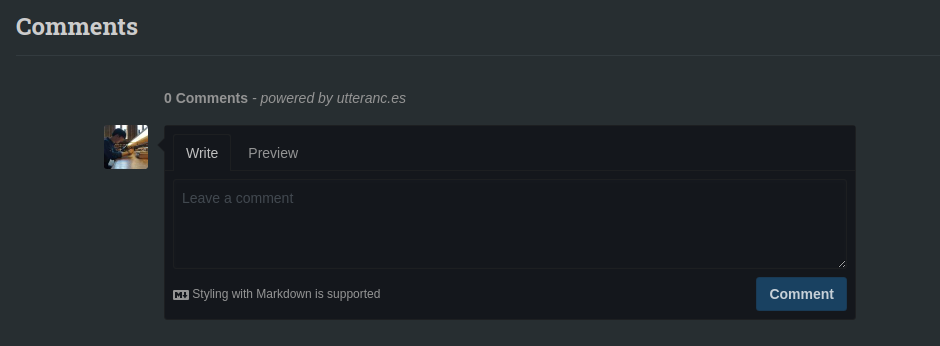Use Utterances/Giscus for Jekyll Comments System

Disqus is used as the default comments plugin for the Hydejack and most of the static sites. But I had some issues with Disqus, so I looked elsewhere to find new comments plugin.
- Disqus loads slowly.
- link within the comment is broken.
The most important reason I chose to move on. Disqus automatically adds prefix starting withdisq.us/url?, the problem is….disq.usis not responding so the link gets lost.
Utterances uses GitHub issues to save & display comments. So you have to give proper permission to the GitHub bot. But once you set things up correctly, it works very smoothly and fast. The only downside I’ve encountered so far is that it requires a user to log in to GitHub to write comments, and there is no default reply function. (All though you can mimic reply using > & @…)
Giscus is almost identical to the Utterances except that it uses GitHub discussion instead of issues.
I have once again migrated to Giscus from Utterances. It seems ‘discussions’ is more appropriate than ‘issues’ to place comments.
It’s not hard to set up Utterances or Giscus.
First of all, you should install Utterances app/Giscus app to the blog repository. After that, since we are gonna migrate from Disqus, proper changes must be made to my-comments.html & links-static.html.
3 files to be modified. (check Utterance commit or Giscus commit)
/_config.yml
/_includes/my-comments.html
/_includes/head/links-static.html
/_sass/my-style.scss
_config.yml
If you followed instructions for Utterances/Giscus, you will end up with simple javascript code like the below.
Utterances
<script src="https://utteranc.es/client.js" repo="[ENTER REPO HERE]" issue-term="pathname" label="comments" theme="photon-dark" crossorigin="anonymous" async> </script>My recommendation for the Utterances theme is,
github-lightfor the light mode,photon-darkfor the dark mode.Giscus
<script src="https://giscus.app/client.js" data-repo="[ENTER REPO HERE]" data-repo-id="[your-repo-id]" data-category="Comments" data-category-id="[your-category-id]" data-mapping="pathname" data-reactions-enabled="1" data-theme="dark_dimmed" crossorigin="anonymous" async> </script>
There are two choices,
- Hard coding: you can simply copy this code to the
my-comments.html. - You can use
_config.ymlso it can be more configurable.
I’ll go with the second choice. Either way, you have to put comments: provider: to the _config.yml.
# file: "/_config.yml"
# Set which comment system to use
comments:
# 'disqus' / 'giscus' / 'utterances' are available
provider: giscus
# You must install utterances github app before use.(https://github.com/apps/utterances)
# Make sure all variables are set properly. Check below link for detail.
# https://utteranc.es/
utterances:
repo: "LazyRen/LazyRen.github.io"
issue-term: "pathname"
label: "Comments"
theme: "dark-blue"
# You must install giscus github app before use.(https://github.com/apps/giscus)
# Make sure all variables are set properly. Check below link for detail.
# https://giscus.vercel.app/
giscus:
repo: "LazyRen/LazyRen.github.io"
repo-id: "[your-repo-id]"
category: "Comments"
category-id: "[your-category-id]"
mapping: "pathname"
reaction-enabled: "1"
theme: "dark_dimmed"
crossorigin: "anonymous"
Insert above variables somewhere in _config.yml.
In my case, I’ve putted in # 3rd Party Integrations where original disqus variable was located.
site.comments.provide will be used in my-comments.html & links-static.html to set up comment section of the post.
You may have different values based on your option choices.
my-comments.html
Choose the right comment provider’s code to insert based on the site.comments.provider. (that we’ve mentioned in _config.yml).
Disqus’s code will remain as-is, we only need to add Utterances/Giscus’s code so it can parse values from _config.yml. If you don’t want to use _config.yml, you may just copy & hard-code script from the Utterances/Giscus.
<!-- file: "/_includes/my-comments.html" -->
{% assign provider = site.comments.provider | default:"disqus" %}
{% if provider == "disqus" %}
{% assign disqus = site.disqus | default:site.disqus_shortname %}
{% if disqus %}
<!-- original disqus codes -->
{% endif %}
{% elsif provider == "utterances" %}
{% assign utterances = site.utterances %}
{% if utterances.repo %}
<script src="https://utteranc.es/client.js"
repo={{ utterances.repo }}
issue-term={{ utterances.issue-term }}
label={{ utterances.label }}
theme={{ utterances.theme }}
crossorigin= "anonymous"
async>
</script>
{% endif %}
{% elsif provider == "giscus" %}
{% assign giscus = site.giscus %}
{% if giscus.repo %}
<script src="https://giscus.app/client.js"
data-repo={{ giscus.repo }}
data-repo-id={{ giscus.repo-id }}
data-category={{ giscus.category }}
data-category-id={{ giscus.category-id }}
data-mapping={{ giscus.mapping }}
data-reactions-enabled={{ giscus.reaction-enabled }}
data-theme={{ giscus.theme }}
crossorigin={{ giscus.crossorigin }}
async>
</script>
{% endif %}
{% endif %}
links-static.html
You don’t want to link Disqus if you are not using it. Wrap linking line with proper if statement.
<!-- file: "/_includes/head/links-static.html" -->
{% if site.comments.provider == "disqus" and site.disqus %}
<link rel="dns-prefetch" href="https://{{ disqus }}.disqus.com" id="_hrefDisqus">
{% endif %}
my-style.scss
To adjust size of Utterances/or of Giscus to fit into the blog content-width, insert below code into _sass/my-style.scss.
/* file: "/_sass/my-style.scss" */
.utterances {
max-width: 100%;
}
.giscus, .giscus-frame {
width: 100%;
}
.giscus-frame {
border: none;
}
Back to How I customized Hydejack Theme
